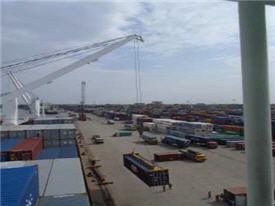Container weight issues have been a serious concern for the industry and the IMO has now agreed to amend SOLAS to put a greater emphasis on the responsibility of shippers to accurately declare cargo weights. These changes will, however, not come in to force until 2016.
The development
The International Maritime Organization's (IMO) Maritime Safety Committee (MSC), which met at the Organization's London headquarters for its 94th session, from 17-21 November 2014, approved draft SOLAS amendments which included addressing the continuing industry concern over the (mis-)declaration of weights for containers consigned for shipment.
The amendments to SOLAS Chapter VI state that authorities will "require mandatory verification of the gross mass of containers, either by weighing the packed container; or weighing all packages and cargo items, using a certified method approved by the competent authority of the State in which packing of the container was completed."
Under these regulations the "correct weight", or "verified weight", shall be determined in one of two ways:
- By weighing the loaded container at an approved weighing station; or
- By ensuring that all the individual items in the container are weighed and added to the container's weight.
The shipper will be responsible for verification of the weight of a container carrying cargo. The shipper is also responsible for ensuring that the verified weight is communicated in the shipping documents sufficiently in advance to be used by the ship's master or his representative and the terminal representative in the preparation of the ship stowage plan. In the absence of the shipper providing the verified weight of the packed container, it should be considered that the container should not be loaded on to the ship unless the master or his representative and the terminal representative have obtained the verified weight through other means.
The SOLAS requirements are expected to enter into force in July 2016 (see MSC.1/Circ.1475 republished alongside this note).
The analysis
While the mandatory nature of the new regulations is welcome news to container carrying vessels, there are still certain issues that shipowners, charterers and NVOCCs need to be aware of and it may be too soon to consider this issue as one that has been successfully resolved.
First is the fact that the new SOLAS regulations will not come in to force until July 2016, which means that in the meantime existing rules, practices and regulations continue to be in place.
Second is that the responsibility for ensuring the container's weight is verified rests with the shipper, and in the MSC.1/Circ.1475 this is defined as: "means a legal entity or person named on the bill of lading or sea waybill or equivalent multimodal transport document (e.g. "through" bill of lading) as shipper and/or who (or in whose name or on whose behalf) a contract of carriage has been concluded with a shipping company."
Given the multitude of parties that may be involved in the transport of a container, from the customer actually packing the box (or part thereof) to logistics companies, and freight forwarders, the entity considered to be "the shipper" may be several steps removed from the vessel or indeed may be several steps removed from the physical box itself. Should therefore a problem arise with a particular box, it may not be always a straight forward route from the vessel to the person responsible for the weight verification.
Third, the effectiveness of these regulations will depend upon the steps taken by the IMO Member States to ensure proper implementation and enforcement of the rules in their own jurisdiction and it may be that different standards will develop in practice in different places.
Loss prevention advice
It is stated in MSC.1/Circ.1475 that containers for which no verified weight is available, should not be loaded. Furthermore nothing should limit a master's ultimate discretion in deciding whether to load a particular box or not. Given, however, the speed of cargo operations for container vessels, the ship and her master are very much dependent on the accuracy of the information supplied to them for the stowage plan and the cargo manifest as well as other relevant cargo documentation. Hence this documentation needs to be ready in advance, and the regulations speak of this as being an important preparatory step before loading.
Ensuring that the master and / or another officer can duly attend to the cargo operations is therefore very important, and that means planning ahead to ensure they are free to attend to this task without being distracted by other issues. Good team work across the crew is essential in this regard.
Furthermore it is envisaged that where a container is rejected for loading, then the associated costs should fall to the shipper, but this is qualified by the statement that ultimately this would be "subject to contractual arrangements between the commercial parties".
From the ship's point of view it is therefore important to have in place clear contractual terms that pass on the risk and cost of having to deal with a box that either did not have a verified weight or which otherwise was found to be unsuitable / unsafe for carriage.

Container cargo operations
Source: Skuld